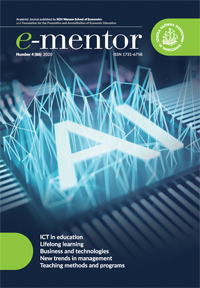Polish-Italian virtual exchange. Learners as teachers of their native languages
Polish-Italian virtual exchange. Learners as teachers of their native languages
Author(s): Anna PieczkaSubject(s): Education, Higher Education
Published by: Szkoła Główna Handlowa w Warszawie, Fundacja Promocji i Akredytacji Kierunków Ekonomicznych
Keywords: virtual exchanges; telecollaboration; physical mobility; virtual mobility; Polish as a foreign language; Italian as a foreign language; online tools; code switching
Summary/Abstract: The article presents the benefits of virtual exchanges/telecollaboration in higher education. Telecollaboration is a form of virtual mobility which can complement or substitute physical mobility. Taking part in virtual exchanges brings benefits which are in line with the recent European recommendations on education. Importantly, telecollaboration requires lower financial outlays and less time comparing to participation in physical exchanges. Thus, its implementation allows the development of various competences (linguistic, digital, intercultural, etc.) despite students’ economic and personal situation. The second part of the study presents a Polish-Italian virtual exchange conducted in the 2018/2019 academic year between the Marie Curie-Skłodowska University and the University of Turin. During the exchange learners of Polish and learners of Italian played the role of their mother tongue teachers. The research aimed to determine whether such a structure of virtual exchange is possible to be successfully implemented among students at the bachelor level. Three factors were analysed during the project: the students’ choice of online tools, forms of presenting language content to partners, and acts of code switching. The data were collected from the students’ production in telecollaborative tasks. It was found that giving students the possibility to choose the language code autonomously did not affect the exchange negatively. However, the students were not sufficiently prepared to act as teachers. Despite being familiar with various online tools, they chose those not adapted to the digital environment, and they found the language issues too complex to be successfully explained to their exchange partners.
Journal: e-mentor
- Issue Year: 86/2020
- Issue No: 4
- Page Range: 4-12
- Page Count: 9
- Language: English

